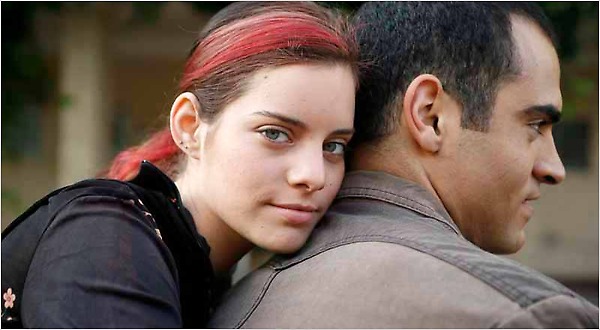|
Reviews of Recent Independent, Foreign, & Documentary Films in Theaters and DVD/Home Video

FOR MY FATHER For My Father works laboriously to demonstrate how the Israeli/Palestinian conflict proves that nothing much has changed since Jean Renoir ruefully observed in 1939’s The Rules of the Game: “The awful thing about life is this: Everybody has their reasons.” It’s another beautiful day in the Middle East. Near the Carmel Market in Tel Aviv, a punk-looking young woman, Keren (Hili Yalon), opens up a storefront. Across the narrow street, an old kibitzer, Katz (Shlomo Wishinski), sits in front of his leaky electronics shop. Across the Palestinian border, a mother wakes up her sleepy son, and the young man, Tarek (Shredi Jabarin), then goes off to get strapped into a suicide bomb vest. Over the course of a “Weekend in Tel Aviv” (the literal translation of the Hebrew title), each character’s complicated motivations challenge some stereotypes and reinforce others. Tarek’s two handlers are already suspicious of his commitment as they drive him across the border, reminding him: “We don’t have an air force, so you’re our air force.” They also press upon him his duty to his father and threaten to setoff the bomb anyway if he hesitates, with the same cell phone they use to fend off nagging calls from their families. (The co-conspirators are portrayed throughout with considerably more absurdly dark humor than the grim supervisors in Hany Abu-Assad’s Paradise Now). Headlines in papers, radio, and TV on both sides of the border warn that a suicide bomber has slipped into Tel Aviv, yet Tarek finds the market, stands amidst the crowd, and presses the button. Nothing happens. Tarek seeks out Katz’s shop for a repair, but he’ll have to wait until after the Saturday Sabbath to get a new switch for the bomb. In the meantime, he becomes entangled in the shopkeepers’ lives, each with parent/child issues as complicated as his own family ties. He repairs Katz’s roof, befriends Katz’s depressed wife, and fends off Keren’s ultra-Orthodox relatives from punishing her for her secular lifestyle—all in one day. The neighbors all assume Tarek speaks Hebrew because he’s an Israeli-Arab construction worker, but it gradually comes out that he has been crossing the border to play for a Nazareth soccer team. (One nicknames him “Maradona” for the Argentine soccer star.) Too inevitably, the attraction between the attractive Tarek and Keren grows. Recently more emotional and powerful films—Jaffa
and the upcoming Ajami—have also been
set in this mixed neighborhood of Israeli Jews and Arabs that looks more
Middle Eastern than the rest of modern Tel Aviv. The immediacy of the
fluid cinematography by Carl F. Koschnick is unfortunately undercut by
Misha Segal’s annoyingly swelling score that emphasizes the story’s
formulaic elements, lessening the film’s sense of regret—the more things
change, the more they stay the same. Nora Lee Mandel
|

